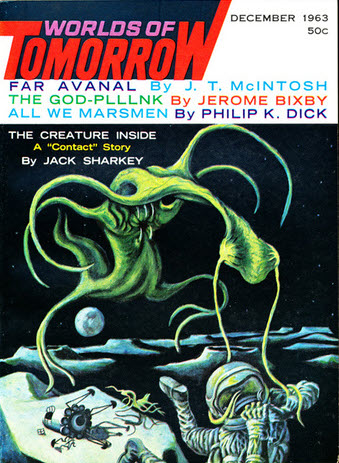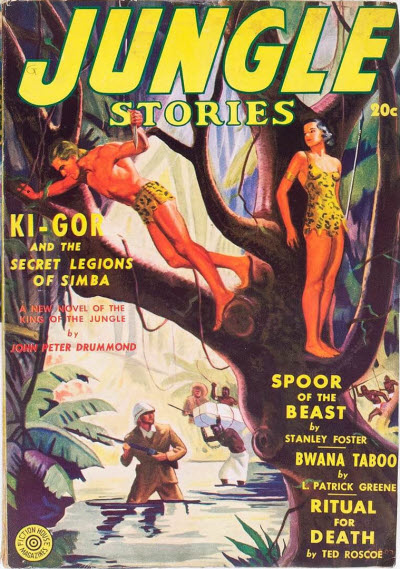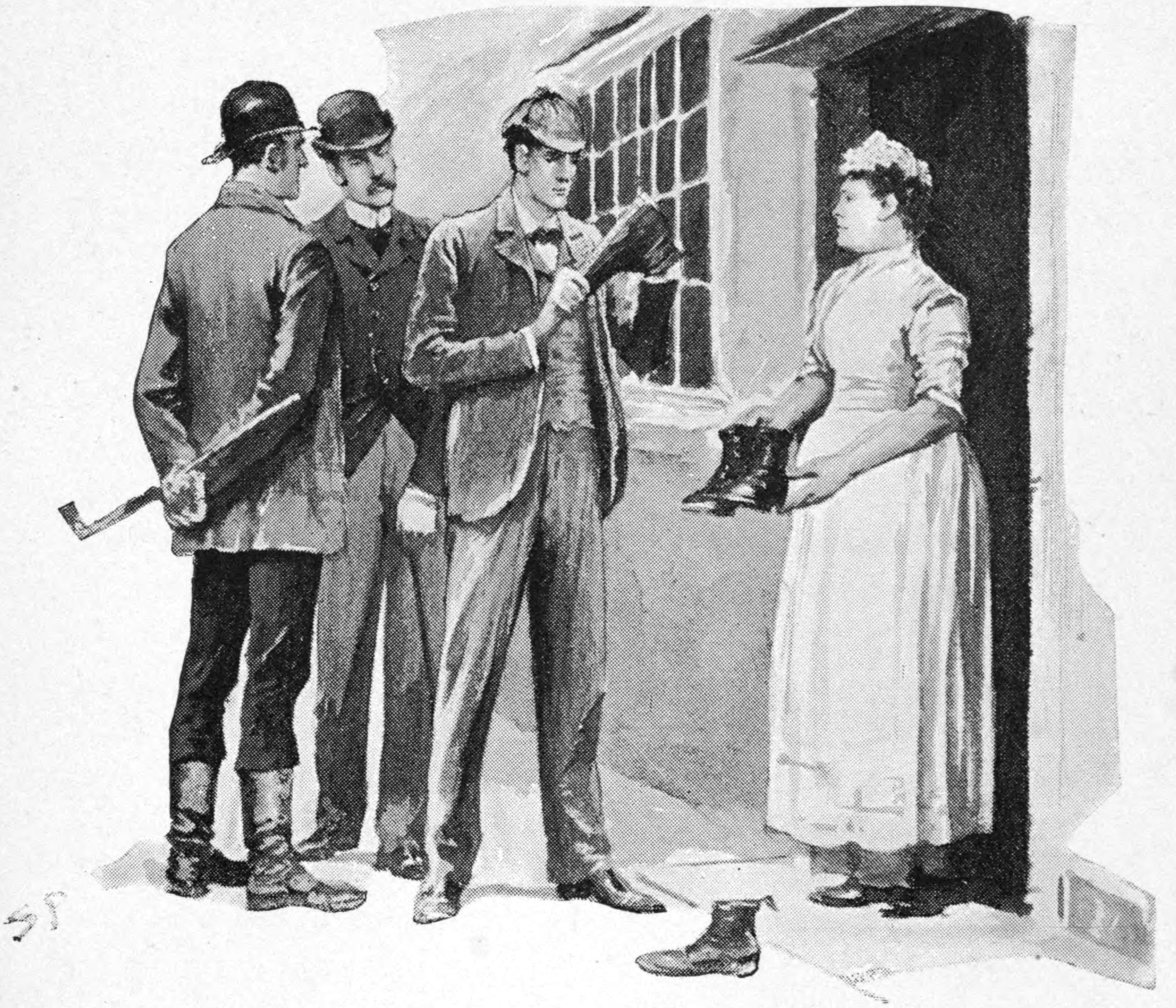|
Planet Stories
''Planet Stories'' was an American pulp science fiction magazine, published by Fiction House between 1939 and 1955. It featured interplanetary adventures, both in space and on some other planets, and was initially focused on a young readership. Malcolm Reiss was editor or editor-in-chief for all of its 71 issues. ''Planet Stories'' was launched at the same time as '' Planet Comics'', the success of which probably helped to fund the early issues of ''Planet Stories''. ''Planet Stories'' did not pay well enough to regularly attract the leading science fiction writers of the day, but occasionally obtained work from well-known authors, including Isaac Asimov and Clifford D. Simak. In 1952 ''Planet Stories'' published Philip K. Dick's first sale, and printed four more of his stories over the next three years. The two writers most identified with ''Planet Stories'' are Leigh Brackett and Ray Bradbury, both of whom set many of their stories on a romanticized version of Mars t ... [...More Info...] [...Related Items...] OR: [Wikipedia] [Google] [Baidu] |
Leigh Brackett
Leigh Douglass Brackett (December 7, 1915 – March 24, 1978) was an American author and screenwriter. Nicknamed "the Queen of space opera, Space Opera", she was one of the most prominent female writers during the Golden Age of Science Fiction. As a screenwriter, she was best known for her collaborations with director Howard Hawks, mainly writing Western (genre), Westerns and crime films. She also worked on an early draft of ''The Empire Strikes Back'' (1980), elements of which remained in the film; she died before it went into production. In 1956, her book ''The Long Tomorrow (novel), The Long Tomorrow'' made her the first woman ever shortlisted for the Hugo Award for Best Novel, and, along with C. L. Moore, one of the first two women ever nominated for a Hugo Award. In 2020, she posthumously won a Retro Hugo for her novel ''The Nemesis From Terra'', originally published as "Shadow Over Mars" (''Startling Stories'', Fall 1944). Early life and education Leigh Brackett was born ... [...More Info...] [...Related Items...] OR: [Wikipedia] [Google] [Baidu] |
Planet Stories March 1951 Cover
A planet is a large, rounded astronomical body that is generally required to be in orbit around a star, stellar remnant, or brown dwarf, and is not one itself. The Solar System has eight planets by the most restrictive definition of the term: the terrestrial planets Mercury, Venus, Earth, and Mars, and the giant planets Jupiter, Saturn, Uranus, and Neptune. The best available theory of planet formation is the nebular hypothesis, which posits that an interstellar cloud collapses out of a nebula to create a young protostar orbited by a protoplanetary disk. Planets grow in this disk by the gradual accumulation of material driven by gravity, a process called accretion. The word ''planet'' comes from the Greek () . In antiquity, this word referred to the Sun, Moon, and five points of light visible to the naked eye that moved across the background of the stars—namely, Mercury, Venus, Mars, Jupiter, and Saturn. Planets have historically had religious associations: multiple cu ... [...More Info...] [...Related Items...] OR: [Wikipedia] [Google] [Baidu] |
Sex And Sexuality In Speculative Fiction
Sexual themes are frequently used in science fiction or related genres. Such elements may include depictions of realistic sexual interactions in a science fictional setting, a protagonist with an alternative sexuality, a sexual encounter between a human and a fictional extraterrestrial, or exploration of the varieties of sexual experience that deviate from the conventional. Science fiction and fantasy have sometimes been more constrained than non-genre narrative forms in their depictions of sexuality and gender. However, speculative fiction (SF) and soft science fiction also offer the freedom to imagine alien or galactic societies different from real-life cultures, making it a tool to examine sexual bias, heteronormativity, and gender bias and enabling the reader to reconsider their cultural assumptions. Prior to the 1960s, explicit sexuality of any kind was not characteristic of genre speculative fiction due to the relatively high number of minors in the target audience. I ... [...More Info...] [...Related Items...] OR: [Wikipedia] [Google] [Baidu] |
Planet Stories Spring 1942 Cover
A planet is a large, rounded astronomical body that is generally required to be in orbit around a star, stellar remnant, or brown dwarf, and is not one itself. The Solar System has eight planets by the most restrictive definition of the term: the terrestrial planets Mercury, Venus, Earth, and Mars, and the giant planets Jupiter, Saturn, Uranus, and Neptune. The best available theory of planet formation is the nebular hypothesis, which posits that an interstellar cloud collapses out of a nebula to create a young protostar orbited by a protoplanetary disk. Planets grow in this disk by the gradual accumulation of material driven by gravity, a process called accretion. The word ''planet'' comes from the Greek () . In antiquity, this word referred to the Sun, Moon, and five points of light visible to the naked eye that moved across the background of the stars—namely, Mercury, Venus, Mars, Jupiter, and Saturn. Planets have historically had religious associations: multiple cu ... [...More Info...] [...Related Items...] OR: [Wikipedia] [Google] [Baidu] |
Jerome Bixby
Drexel Jerome Lewis Bixby (January 11, 1923 – April 28, 1998) was an American short story writer and scriptwriter. He wrote the 1953 story ''It's a Good Life'', which was included in '' The Science Fiction Hall of Fame''. ''It's a Good Life'' formed the basis of a 1961 episode of ''The Twilight Zone'' and was remade in '' Twilight Zone: The Movie'' (1983). He wrote four episodes for the ''Star Trek'' series: '' Mirror, Mirror, Day of the Dove, Requiem for Methuselah'', and '' By Any Other Name''. With Otto Klement, he co-wrote the story upon which the science fiction movie ''Fantastic Voyage'' (1966), the related television series, and the related Isaac Asimov novel were based. Bixby's final produced or published work so far was the screenplay for the 2007 science fiction film ''The Man from Earth''. He also wrote many westerns and used the pseudonyms Jay Lewis Bixby, D. B. Lewis, Harry Neal, Albert Russell, J. Russell, M. St. Vivant, Thornecliff Herrick, and Alger Rom ... [...More Info...] [...Related Items...] OR: [Wikipedia] [Google] [Baidu] |
Masthead (American Publishing)
In American usage, a publication's masthead is a printed list, published in a fixed position in each edition, of its owners, departments, officers, contributors and address details,E.g./ref> which in British English usage is known as imprint.''The Guardian'': "Newspaper terminology" Linked 2013-06-16 Flannel panel is a humorous term for a masthead panel. In the UK and many other Commonwealth nations, "the masthead" is a publication's designed title as it appears on the front page: what, in American English, ... [...More Info...] [...Related Items...] OR: [Wikipedia] [Google] [Baidu] |
Jungle Comics
jungle is land covered with dense forest and tangled vegetation, usually in tropical climates. Application of the term has varied greatly during the past century. Etymology The word ''jungle'' originates from the Sanskrit word ''jaṅgala'' (), meaning rough and arid. It came into the English language in the 18th century via the Hindustani word for forest ( Hindi/Urdu: /) (Jangal). ''Jāṅgala'' has also been variously transcribed in English as ''jangal'', ''jangla'', ''jungal'', and ''juṅgala''. It has been suggested that an Anglo-Indian interpretation led to its connotation as a dense "tangled thicket". The term is prevalent in many languages of the Indian subcontinent, and the Iranian Plateau, where it is commonly used to refer to the plant growth replacing primeval forest or to the unkempt tropical vegetation that takes over abandoned areas. Wildlife Because jungles occur on all inhabited landmasses and may incorporate numerous vegetation and land types in diffe ... [...More Info...] [...Related Items...] OR: [Wikipedia] [Google] [Baidu] |
Atlantis
Atlantis () is a fictional island mentioned in Plato's works '' Timaeus'' and ''Critias'' as part of an allegory on the hubris of nations. In the story, Atlantis is described as a naval empire that ruled all Western parts of the known world, making it the literary counter-image of the Achaemenid Empire. After an ill-fated attempt to conquer "Ancient Athens," Atlantis falls out of favor with the deities and submerges into the Atlantic Ocean. Since Plato describes Athens as resembling his ideal state in the ''Republic'', the Atlantis story is meant to bear witness to the superiority of his concept of a state. Despite its minor importance in Plato's work, the Atlantis story has had a considerable impact on literature. The allegorical aspect of Atlantis was taken up in utopian works of several Renaissance writers, such as Francis Bacon's ''New Atlantis'' and Thomas More's ''Utopia''. On the other hand, nineteenth-century amateur scholars misinterpreted Plato's narrative as histo ... [...More Info...] [...Related Items...] OR: [Wikipedia] [Google] [Baidu] |
Jungle Stories (magazine)
''Jungle Stories'' was an American pulp magazine published from 1938 to 1954. The lead stories featured the adventures of Ki-Gor, the son of a Scottish missionary raised in the jungle like Tarzan. For the first two years, the novels formed a continuous narrative, including Ki-Gor meeting Helene Vaughan, a pilot who crashes in the jungle and is saved by Ki-Gor; they later marry. After 1940, the novels were unconnected episodes featuring both of them fighting perils that included some science fictional tropes such as talking gorillas and dinosaurs. The first novel was written by John M. Reynolds; all the later novels were listed under the house name "John Peter Drummond". Some of these were written by Stanley Mullen, but the authors of the others are unknown. Short stories appeared alongside the lead novel in each issue, from authors including Wilbur S. Peacock, Duane Rimel, Dan Cushman, Bryce Walton, and E. Hoffman Price.Weinberg (1985), pp. 365-366. Bibliographic detail ... [...More Info...] [...Related Items...] OR: [Wikipedia] [Google] [Baidu] |
Detective Fiction
Detective fiction is a subgenre of crime fiction and mystery fiction in which an criminal investigation, investigator or a detective—whether professional, amateur or retired—investigates a crime, often murder. The detective genre began around the same time as speculative fiction and other genre fiction in the mid-nineteenth century and has remained extremely popular, particularly in novels. Some of the most famous heroes of detective fiction include C. Auguste Dupin, Sherlock Holmes, Kogoro Akechi, Miss Marple and Hercule Poirot. Juvenile stories featuring The Hardy Boys, Nancy Drew, and The Boxcar Children have also remained in print for several decades. History Ancient Some scholars, such as R. H. Pfeiffer, have suggested that certain ancient and religious texts bear similarities to what would later be called detective fiction. In the Old Testament story of Susanna (Book of Daniel: 13), Susanna and the Elders (the Protestant Bible locates this story within the apocrypha), t ... [...More Info...] [...Related Items...] OR: [Wikipedia] [Google] [Baidu] |
Great Depression
The Great Depression was a severe global economic downturn from 1929 to 1939. The period was characterized by high rates of unemployment and poverty, drastic reductions in industrial production and international trade, and widespread bank and business failures around the world. The economic contagion began in 1929 in the United States, the largest economy in the world, with the devastating Wall Street stock market crash of October 1929 often considered the beginning of the Depression. Among the countries with the most unemployed were the U.S., the United Kingdom, and Weimar Republic, Germany. The Depression was preceded by a period of industrial growth and social development known as the "Roaring Twenties". Much of the profit generated by the boom was invested in speculation, such as on the stock market, contributing to growing Wealth inequality in the United States, wealth inequality. Banks were subject to laissez-faire, minimal regulation, resulting in loose lending and wides ... [...More Info...] [...Related Items...] OR: [Wikipedia] [Google] [Baidu] |
Hugo Gernsback
Hugo Gernsback (; born Hugo Gernsbacher, August 16, 1884 – August 19, 1967) was a Luxembourgish American editor and magazine publisher whose publications included the first science fiction magazine, ''Amazing Stories''. His contributions to the genre as publisher were so significant that, along with the novelists Jules Verne and H. G. Wells, he is sometimes called "The Father of Science Fiction". In his honor, annual awards presented at the World Science Fiction Convention are named the "Hugo Award, Hugos". Gernsback emigrated to the U.S. in 1904 and later became a citizen. He was also a significant figure in the electronics and radio industries, even starting a radio station, WRNY, and the world's first magazine about electronics and radio, ''Modern Electrics''. Gernsback died in New York City in 1967. Personal life Gernsback was born in 1884 in Luxembourg City, to Berta (Dürlacher), a housewife, and Moritz Gernsbacher, a winemaker. His family was Jewish. Gernsback emigr ... [...More Info...] [...Related Items...] OR: [Wikipedia] [Google] [Baidu] |











